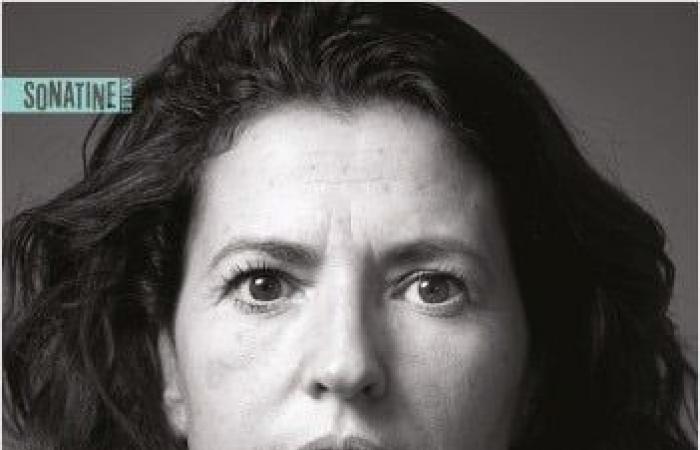« Is any truth good to tell? » To the epigraph of Me Clarisse Serre’s new book, after reading this terrifying testimony, the answer is no. In The Lawyer and the Repentant to be published on January 23, the criminal lawyer from Bobigny (Seine-Saint-Denis) recounts the hell that she and “the balance” experienced in serious legal cases. At issue are the inadequacies of the witness protection system and the exorbitant power of those who ensure its proper execution. Or not.
Me Clarisse Serre publishes her second book with Sonatine Éditions (1). The Lioness of the Barthe title of the first, here reinforces her reputation as a rebellious, outspoken warrior. With an effective style borrowed from thrillers, the one that appears in the magazine’s ranking GQ of the 30 most powerful criminal lawyers reveals behind the scenes in which a repentant evolves. Supposedly supported by the law of March 9, 2004 and article 132-78 of the Penal Code, by title 21 of the Code of Criminal Procedure relating to the protection of witnesses, and by the decree of March 17, 2014 which specifies the terms of application (ten years later!) entrusted to the National Commission for Protection and Reintegration (CNPR), the repentant in fact turns out to be very isolated in the face of the pitfalls of his new life. And sometimes even released into the open countryside by the CNPR having power of life or death over those who have changed their identity, excluding them from the program without having to justify it.
This is what we discover, startled, in this work. Me Serre testifies to the horrors that together they suffered. She, the lawyer called in March 2018; him, the man who “spoke”, entrusted to the Interministerial Technical Assistance Service (SIAT). Police officers who build a legend, create false papers, false CVs, false pay slips, and watch over a family. Until they wash their hands of it…
“Faced with incompetence, cowardice, threats”
In this book which can be read in one go, Me Serre, bound by professional secrecy and always discreet, does not name anyone. We will respect this choice although it is easy to identify the characters of the two criminal cases in which his client was involved. She herself makes no secret of it: these are the assassinations at Bastia-Poretta airport tried in 2024 and the escape from the Réau penitentiary center whose trial was held in 2023. This is enough to understand the danger faced by the repentant, his wife and his three children.
“In the current state of the texts and in view of my experience, I affirm without hesitation [qu’]you would have to be crazy to collaborate” with investigators and the justice system. “Really, I advise against it to anyone,” writes the criminal lawyer. If his opinion is so clear-cut, it is because the story of his repentance goes beyond fiction. After six years at his side, she admits to having “broken down”, to having “gone through all the feelings”, to having “feared for [sa] own life” and having been “confronted with incompetence, cowardice, threats and loneliness”: “This particular case had a huge impact on me. […] I became even more suspicious, distrustful and combative. »
This “special case” could inspire the legislator called to improve the status of repentants/protected witnesses, encouraged by senators Etienne Blanc (LR) and Jérôme Durain (PS), authors of the report on drug trafficking in France delivered on May 14, 2024 (see our article of May 22 ici). Ministers Bruno Retailleau (Interior) and Gérald Darmanin (Justice) want their work to be followed up by 2025.
The three children must “learn to lie” about their identity
When Me Serre was called to her office in March 2018, her anonymous interlocutor suggested a secret meeting. “We” will pick her up at a metro exit, you will have to follow a man with earpieces. His “feel of being in a film” has “an exciting side”: “I was going to discover a completely unknown and mysterious universe, that of identity protection. »
In a space of coworking in Paris, she meets the repentant: a cultured man, former chief of staff, specialist in the Middle East. In police custody from December 18, 2017 for criminal conspiracy, heard eight times, he “dismissed” everything he knew about the criminal projects of the “Other”, thus designated in the book, who works under bracelet electronics in a hotel in La Baule. For ten months, they maintained a friendly relationship – the wives also bonded. The repentant has heard everything, seen everything. Worse, he provided services and was lent €75,000. The trap closed on him when he could not repay.
SO ? Speak out or go to jail? He chooses to sit down at the table. The double assassination in Bastia-Poretta, first. “These confessions had the effect of a bomb” and convinced the investigating judge to contact the CNPR to have him enter the witness protection program, under the supervision of the SIAT. The police custody of the repentant and his wife are lifted. On March 29, 2018, by order of the president of the Paris judicial court, the family changed its identity. Including three minors “embarked in the turmoil”, who must “teach to lie”. To tolerate changes of school and regions. “Is a father who becomes a scale still a hero? » What a dilemma! To the author, who does not judge, it appears certain that in speaking, “he did not have the consequences in mind”: “Inventing 20 years of life constructed from scratch” and “putting his child through the ordeal.” wife and her children. »
Especially since, soon, the machine will seize up and disaster will strike.
Exclusion from the program by the CNPR, a first in France
On April 15, 2021, “unanimously”, the CNPR issued an exclusion opinion: the five members of the family will no longer be entitled to SIAT assistance nor to their assumed name or to their funded situation. by Agrasc, the Criminal Assets Recovery Agency. The CNPR hears neither the repentant nor his lawyer who learns of the exclusion “through the press”! From then on, Clarisse Serre no longer holds back her blows against this Commission of eight people, including four magistrates.
The latter did not even notify their colleagues responsible for investigating criminal cases where this collaborator of justice plays a crucial role. “There, I found myself really alone. Alone with him,” she laments. Especially since, contravening the law on witness protection, a journalist from Monde revealed the content of X.’s confessions and elements of biography allowing his identification. An offense… dismissed without further action! Will he now write that he no longer benefits from protection?
Me Serre will fight against the CNPR all the way to the Court of Cassation. On March 2, 2022, the 1era civil chamber issues an exemplary judgment, for two reasons: it is unassailable and removes the ambiguity of article 23 of the decree of March 2014 on the possibility of withdrawing an assumed name; he reminds the administrative commission that the judge, who is independent, is the only one authorized in this matter. “There is no reason to terminate the authorization to use the assumed identity granted to the partners because of the serious danger to which they would then be exposed,” wrote the Court of Cassation. A first.
And a victory, after a year of trembling under the threats of “the Other” who promises to “cut off the head” of X. “with a rusty saw”. A SIAT police officer responded to the indignant lawyer that his client “had only to choose better who he associates with”.
At the trial of Réau’s escape, “the betrayal” of his colleagues
Other incidents will mark the following years, notably when X. will appear in 2023 at the trial of the 12 accused of the escape from Réau prison. To protect her client from the public and the media, Clarisse Serre requested and obtained the application of articles 706-63-1 and 706-63-2 of the CPP. Thus, the repentant testified behind a screen. “There was a climate of intimidation that I had never experienced before,” she remembers – her 28 years at the helm nevertheless armored her. Invectives against him and the behavior of the defense will force the president of the Assize Court to seize the president of Paris, and the gendarmes to escort him.
The Bobigny lawyer remains lastingly marked by “the betrayal” of the defense, her own colleagues, by the “escalation of aggressiveness, of taking sides, of insults”. She knew them all: they will recognize each other. “I fell from a height. » Then, by a coincidence that we only imagine in the cinema, a malfunction allows X.’s face to appear on the screens placed among the public, normally turned off at the time he was giving his testimony. The administrative investigation is “still ongoing”. We think we’re dreaming.
The lawyer describes other grotesque situations which almost made her let go of her protégé. His document is appalling from start to finish. But, in order not to conclude negatively, she uses her experience to recommend simple reforms, without forcing the State to find financial means, and develops what is practiced elsewhere, notably in Italy. A precursor, the country created the status of repentant in the 1970s: there were already 1,200 justice employees in 2013 – compared to 60 in France in 2024! His “calls for change” are consistent with the conclusions of the senatorial report. Finally, she hopes that repentants or protected witnesses benefit from the assistance of a lawyer, that the principle of adversarial proceedings is respected by the CNPR. It’s the least in a democracy. Otherwise, “who would want to talk?” » she asks. In light of his revelations, no one.
(1) The Lawyer and the Repentantby Clarisse Serre, Sonatine Éditions, 208 pages, €20. From the same publisher in 2022: The Lioness of the Bar192 pages, 20 €.






